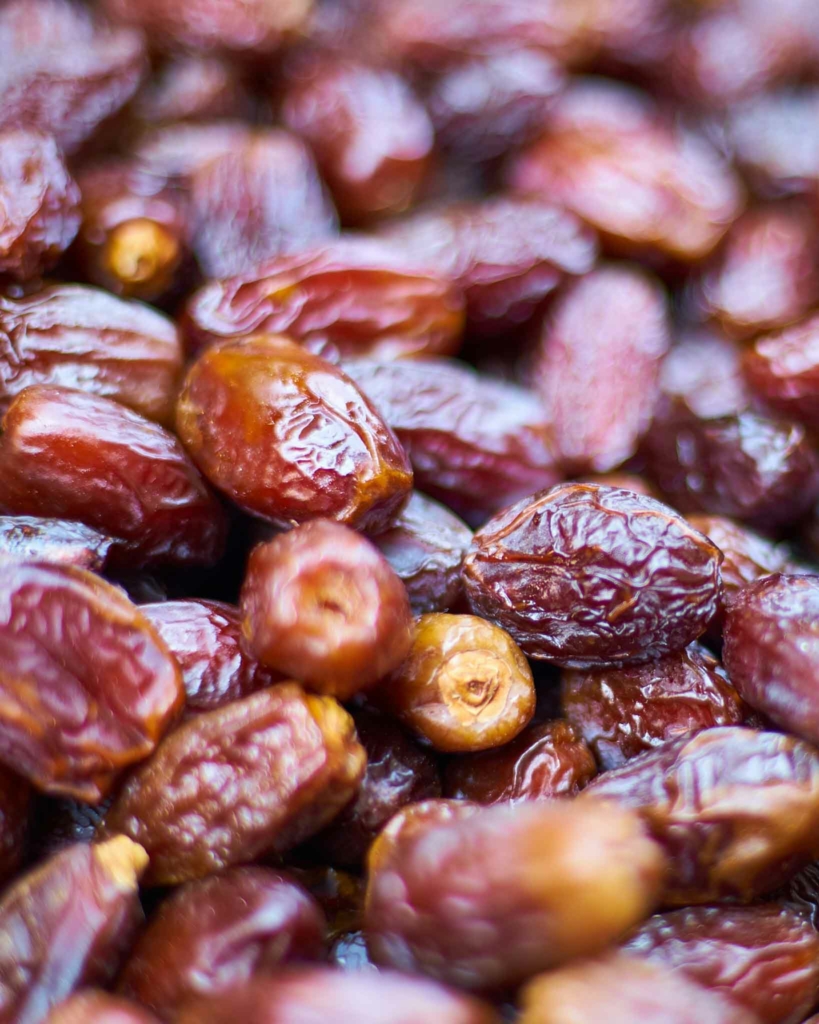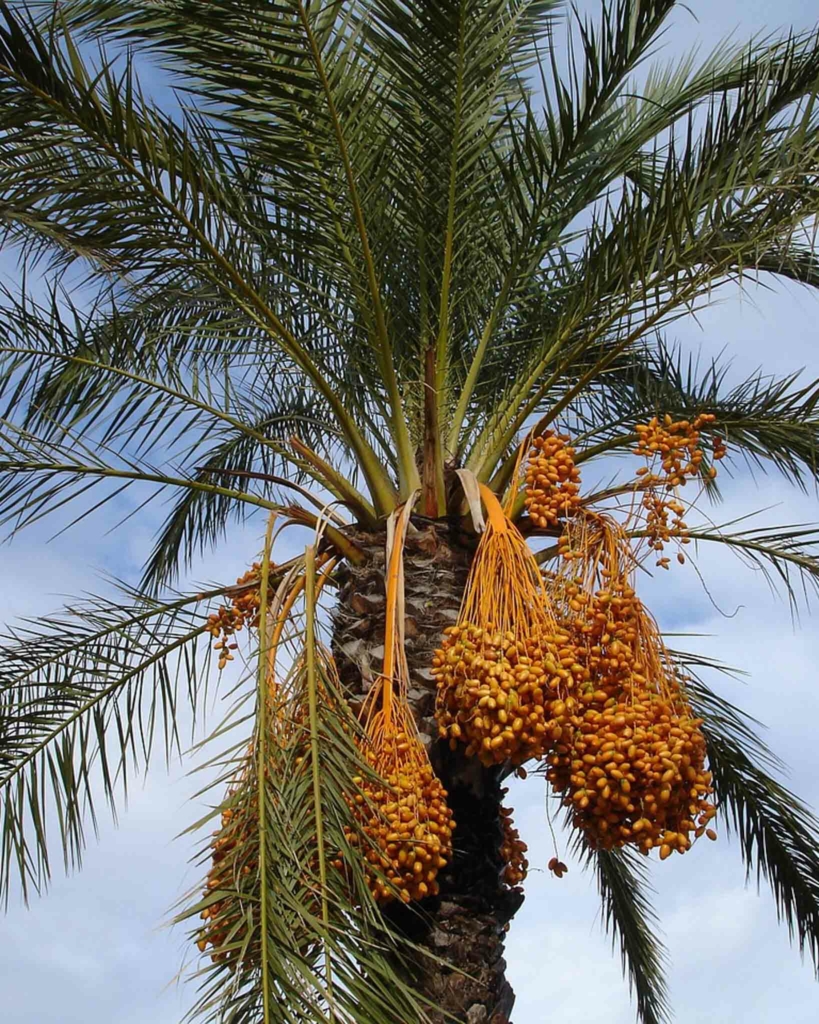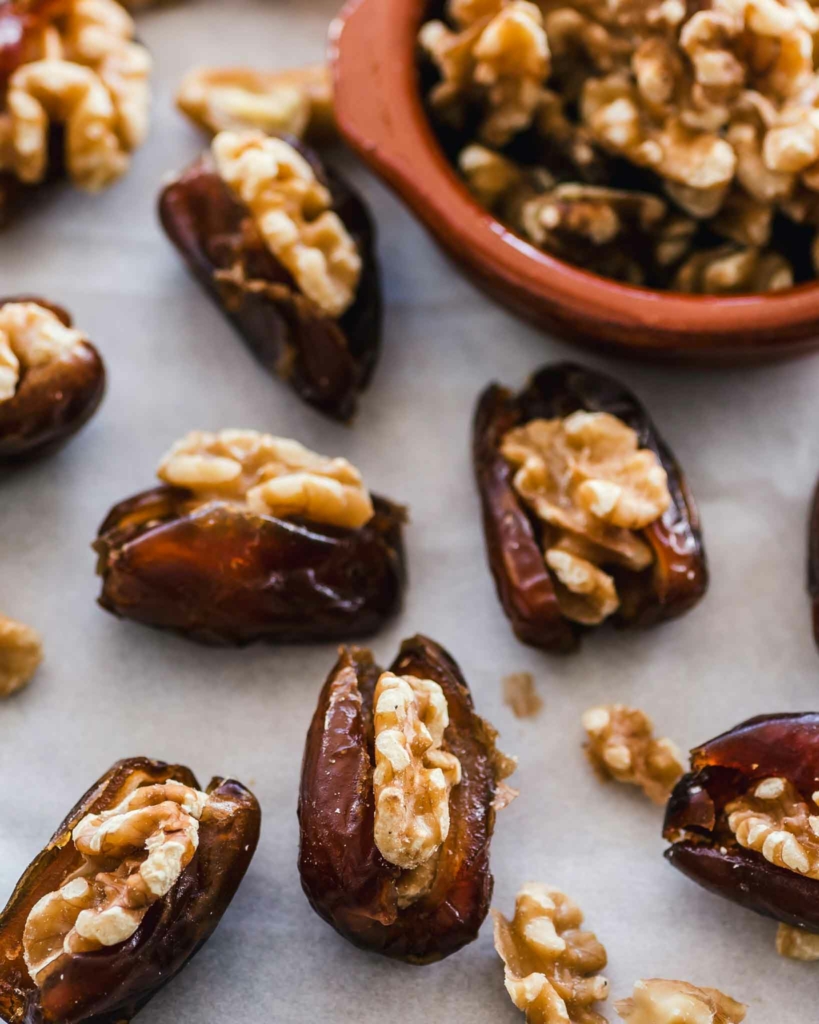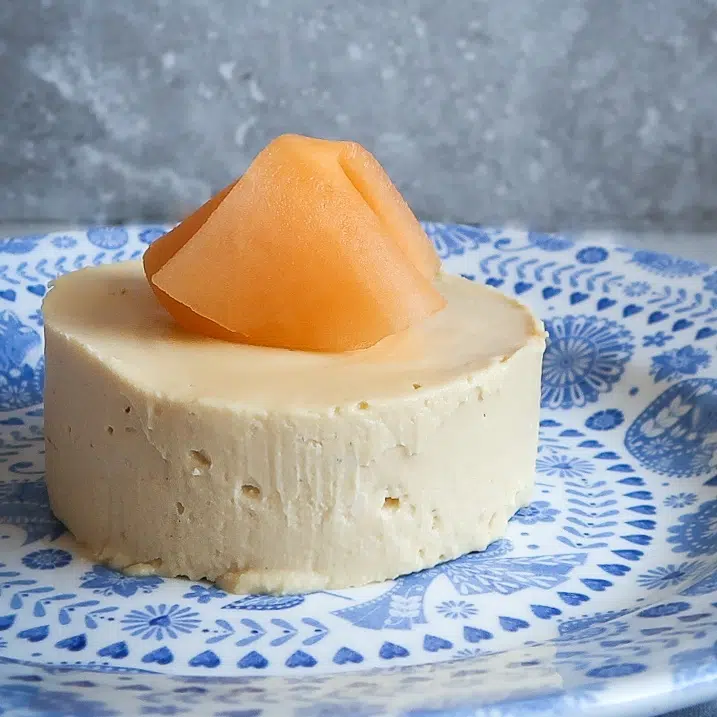When you buy through our links, we may earn a commission. Learn more.
Are dates low carb? The answer, for those following a strict low-carb or ketogenic diet, is sadly no. Dates are a naturally sweet fruit with a concentrated source of energy, but this energy comes at a cost – a high carbohydrate content. While dates offer a variety of potential health benefits, their significant amount of carbs necessitates careful consideration for those aiming to restrict carbohydrate intake.
Dates, the chewy and naturally sweet fruit of the date palm tree, have been enjoyed for centuries in the Middle East and beyond. In recent years, they’ve gained popularity as a potential sugar substitute and source of nutrients. But for those following a low-carb diet, a question arises: can dates be incorporated without jeopardising ketosis or other low-carb goals?
Let’s take a look at if and how dates might fit into a low-carb lifestyle. Click one of the links below to jump to a specific section of this article.
Quick Links:
- Key nutrients in dates
- Dates and health (digestion, blood sugar and pregnancy)
- Can dates fit into a low-carb diet?
- Alternatives to dates for a low-carb diet
- Summary
Disclaimer: The information provided in this blog post is intended for interest-purposes only. It does not constitute medical advice, nor should it be used to make decisions of a medical nature. Always consult your doctor before making changes to your diet and if you have any health concerns. The authors of this blog post are not trained medical professionals. We have researched the topic using various sources that we believe to be reputable, the references for which can be found quoted in brackets at the end of the sentence in question. This blog post was last updated in June 2024.
Key Nutrients in Dates
Dates are a dried fruit prized for their concentrated source of energy and a unique blend of essential nutrients. Despite their higher calorie content compared to fresh fruits, dates offer a compelling nutritional profile that can benefit a balanced diet.
Here’s a breakdown of key nutrients found in a 100-gram (3.5-ounce / approx 5 pitted dates) serving of Medjool dates:
- Calories: 277
- Carbohydrates: 75 grams total carbs
- Fibre: 7 grams
- Net Carbs: 68 grams
- Protein: 2 grams
- Copper: 40% DV
- Potassium: 15% DV
- Vitamin B6: 15% DV
- Magnesium: 13% DV
- Manganese: 13% DV
- Calcium 5% DV
- Iron: 5% DV
Approximate data, taken from the USDA Nutrient Database and approximate values calculated using the FDA recommended daily values (DV).
A breakdown of key nutrients:
Carbohydrates
Dates are a good source of carbohydrates, primarily in the form of natural sugars.
Fibre
A 100g serving of dates provides almost 7g of dietary fibre.
Fibre can benefit digestive health by promoting regular bowel movements (3). Fibre may also help to slow digestion and control blood sugar in some people (4).
Protein
While not a protein powerhouse, dates offer a small but valuable amount of protein, which can contribute to satiety (the feeling of being full).
Minerals
Dates are a rich source of essential minerals, including potassium, magnesium, copper, and manganese (1) making them a great addition to a healthy diet. These minerals play vital roles in various bodily functions, including muscle and nerve function, blood pressure regulation and supporting the immune system (5).
Iron
Dates provide a small amount of iron, which is essential for oxygen transport throughout the body (6).
Vitamin B6
Dates are a good source of Vitamin B 6, a vitamin that supports brain function and the immune system (7).
Antioxidants
Dates provide antioxidants, which may help prevent or slow the cell damage caused by free radicals (8, 9).
Dates offer a source of energy, fibre, vitamins, and minerals. While their sugar content requires mindful consumption, particularly for those following specific dietary plans, dates can be a valuable addition to a balanced diet, providing essential nutrients and potential health benefits.
Dates and Health
Digestive Health
One of the highlights of dates is their high fiber content. A single serving (100g / 5 dates) provides nearly 7 grams of fibre, aiding digestion and promoting regularity. Studies have shown that consuming dates can improve stool frequency (10). Additionally, the fibre in dates may play a role in blood sugar control by slowing down digestion and preventing spikes after meals for some people (4).
Blood Sugar
While dates offer a natural source of sweetness, their high sugar content raises concerns for those following a low-carb diet. Dates have a glycemic index (GI) score lower than many other fruits, indicating that they may cause less significant spikes in blood sugar (11) . However, the high amount of carbohydrates can still impact blood sugar for some individuals.
Here’s where portion control and mindful consumption become crucial. Studies suggest that enjoying dates in moderation alongside healthy fats and proteins can help to to manage blood sugar levels (12).
Pregnancy
Dates have been traditionally consumed by pregnant women in the later stages of pregnancy to promote natural labour. Research suggests some possible benefits:
- Higher cervical dilation: A study of pregnant women who consumed six dates per day for four weeks prior to their due date, found that they had a significantly higher mean cervical dilatation upon admission compared to the non-date consuming group.
- Higher spontaneous labour: In the same study, spontaneous labour occurred in 96% of those who consumed dates, vs 79% of those who did not consume dates.
- Shorter labor time: The study also indicated that the first stage of labour was shorter in women who consumed dates vs those who did not (13).
While these findings are encouraging, more research is needed to confirm the exact mechanisms and long-term effects. It’s important to consult with a healthcare professional before incorporating dates into your pregnancy diet, especially if you have any pre-existing medical conditions.
Other Potential Health Benefits
Dates offer a range of potential health benefits beyond those mentioned above including:
- Rich in Antioxidants: Dates are thought to provide a source of antioxidants that may help protect your cells from damage and may therefore help to reduce the risk of chronic diseases (8).
- Brain Health: Studies suggest that the antioxidants in dates may improve brain function by reducing inflammation and could potentially help to lower the risk of neurodegenerative diseases like Alzheimer’s (14).
- Natural Sweetener: Dates can be a healthy substitute for refined sugar in recipes, adding sweetness and a touch of caramel flavour.
Can dates fit into a low-carb diet?
The suitability of dates in a low-carb diet depends on individual factors like carbohydrate tolerance, overall dietary goals, and activity level. Here are some key considerations:
Carbohydrate Tolerance
Individual carbohydrate tolerance varies. Those adhering to very low-carb diets such as a ketogenic diet (usually less than 50 grams of net carbs per day) may find it challenging to incorporate dates due to their high carbohydrate content (around 75 grams of carbohydrates per 100 gram serving).
Dietary Goals
The specific goals of a low-carb diet play a role. If weight loss is the primary focus, strict monitoring of carbohydrate intake is often important (15). Dates, while offering valuable nutrients, may need to be limited or consumed strategically due to their high carbohydrate content.
Activity Level
Physical activity level influences carbohydrate needs. Individuals (on a low carb diet) with a more active lifestyle will potentially have more wiggle room to incorporate dates in moderation.
Here are some key considerations to consider when it comes to date consumption within a low-carb framework:
- Moderation is Key – Regardless of individual carbohydrate tolerance or dietary goals, moderation is essential. Limiting intake to a small serving, like 2-3 dates, can help to manage their carbohydrate impact.
- Strategic Pairing – Combining dates with healthy fats and protein sources can be beneficial. Pairing them with nuts, nut butter or avocado may further slow down digestion and potentially minimise blood sugar spikes (12).
- Blood Sugar Monitoring – For individuals concerned about blood sugar spikes, monitoring blood sugar response after consuming dates is crucial. This personalised approach allows for adjustments in serving size or frequency of consumption to ensure dates fit comfortably within their low-carb plan. It’s important to consult with your doctor if you are concerned about blood sugar levels.
Here are some quick-fire answers to the most frequently asked questions:
Are dates low carb?
No, dates have a high carbohydrate content at around 75 grams of total carbohydrates per 100g of dates.
What are the net carbs in dates?
Medjool dates contain around 68g of net carbs per 100g serving (approximately 5 pitted dates). Therefore, one date contains around 14g of net carbs, depending on the weight of the date.
Can I eat dates on a low carb diet?
It depends on how ‘low carb’ your diet is. Some low carb dietary plans allow for a carb intake of up to 130g of carbs per day (16) and at this level, it would likely be possible to include some dates in a low carb diet. However, at around 14g of net carbs per date, it may be beneficial to limit date consumption to a small portion.
Are dates keto friendly?
Sadly not. The high carb content of dates makes it very difficult to include them in a strict keto diet in any meaningful quantity.
How many dates can I eat on keto?
A ketogenic diet usually involves a person consuming less than 50g of net carbs per day (16). With a single date containing around 14g of net carbs, it would likely not be feasible to eat any dates whilst on keto without having a negative impact on the amount of calories and other nutrients you could consume.
Alternatives to dates for a low-carb diet
For those following a low carb or low sugar diet but still craving the sweetness of fruit, try some of these low carbohydrate alternatives to dates:
- Blackberries – 10g of carbs (4g net carbs) per 100g of fruit (20)
- Raspberries – 12g of carbs (5g of net carbs) per 100g of fruit (17)
- Strawberries – 8g of carbs (6g net carbs) per 100g of fruit (19)
- Watermelon – 8g of carbs (7g of net carbs) per 100g of fruit (18)
- Cantaloupe – 8g of carbs (7g net carbs) per 100g of fruit (21)
- Oranges – 12g of carbs (9g of net carbs) per 100g of fruit (23)
- Kiwi – 15g of carbs (12g of net carbs) per 100g of fruit (22)
Approximate data, taken from the USDA Nutrient Database.
We hope you enjoy some of these low-carb fruits as keto-friendly alternatives to dates.
Summary
Dates are a delicious and nutritious fruit with a variety of potential health benefits. However, their high carbohydrate content necessitates careful consideration of portion sizes for those following a low-carb diet. By understanding their nutritional profile, potential impact on blood sugar, and strategic consumption methods, you can decide if dates can be a welcome addition to your low-carb lifestyle.
Here’s a quick recap:
- Dates are thought to be a good source of fibre, antioxidants, and various essential nutrients.
- They are high in carbohydrates and sugar.
- Moderation and mindful pairing with healthy fats and protein may be beneficial for low-carb consumption.
- Dates may offer benefits including blood sugar control, potential brain health support and aiding natural labour.
Ultimately, the decision to include dates in your low-carb diet is a personal one. By weighing the potential benefits against the carbohydrate impact and considering your individual needs, you can make an informed choice that aligns with your dietary goals.
Here are some low carb vegan recipes you may enjoy:
Resources
- USDA – FoodData Central (https://fdc.nal.usda.gov/fdc-app.html#/food-details/168191/nutrients)
- FDA – Daily Value on Nutrition and Supplement Facts Labels (https://www.fda.gov/food/nutrition-facts-label/daily-value-nutrition-and-supplement-facts-labels)
- NIH – Whole Fruits and Fruit Fiber Emerging Health Effects (https://www.ncbi.nlm.nih.gov/pmc/articles/PMC6315720/)
- NIH – Dates fruits effects on blood glucose among patients with diabetes mellitus: A review and meta-analysis (https://www.ncbi.nlm.nih.gov/pmc/articles/PMC8281151/)
- Medical News Today – Why do we need magnesium? (https://www.medicalnewstoday.com/articles/286839)
- Medical News Today – Everything you need to know about iron (https://www.medicalnewstoday.com/articles/287228)
- Medical News Today – The benefits and food sources of vitamin B6 (https://www.medicalnewstoday.com/articles/219662)
- Healthline – 8 proven Health Benefits of Dates (https://www.healthline.com/nutrition/benefits-of-dates#TOC_TITLE_HDR_4)
- Medical News Today – How can antioxidants benefit our health? (https://www.medicalnewstoday.com/articles/301506#_noHeaderPrefixedContent)
- NIH – Impact of palm date consumption on microbiota growth and large intestinal health; a randomised, controlled, cross-over, human intervention study (https://www.ncbi.nlm.nih.gov/pubmed/26428278)
- Healthline – Can people with diabetes eat dates? (https://www.healthline.com/nutrition/dates-for-diabetes#:~:text=They found that dates generally,is glycemic load (GL).)
- Medical News Today – Are dates good for diabetes? (https://www.medicalnewstoday.com/articles/are-dates-good-for-diabetics#:~:text=Pairing dates with a source,help manage blood sugar levels[.](https://www.medicalnewstoday.com/articles/are-dates-good-for-diabetics#:~:text=Pairing dates with a source,help manage blood sugar levels.))
- NIH – The effect of late pregnancy consumption of date fruit on labour and delivery (https://pubmed.ncbi.nlm.nih.gov/21280989/)
- NIH – Protective effects of flavonoids against Alzheimer’s disease-related neural dysfunctions (https://www.ncbi.nlm.nih.gov/pubmed/28641164)
- Healthline – Why Do Low Carb Diets Work? The Mechanism Explained (https://www.healthline.com/nutrition/why-do-low-carb-diets-work)
- Medical News Today – How many carbs can I eat on a keto diet? (https://www.healthline.com/nutrition/why-do-low-carb-diets-work)
- USDA – Raspberries, raw (https://fdc.nal.usda.gov/fdc-app.html#/food-details/167755/nutrients)
- USDA – Watermelon, raw (https://fdc.nal.usda.gov/fdc-app.html#/food-details/167765/nutrients)
- USDA – Strawberries, raw (https://fdc.nal.usda.gov/fdc-app.html#/food-details/2346409/nutrients)
- USDA – Blackberries, raw (https://fdc.nal.usda.gov/fdc-app.html#/food-details/173946/nutrients)
- USDA – Melons, cantaloupe, raw (https://fdc.nal.usda.gov/fdc-app.html#/food-details/169092/nutrients)
- USDA – Kiwifruit, green, raw (https://fdc.nal.usda.gov/fdc-app.html#/food-details/168153/nutrients)
- USDA – Oranges, raw, Florida (https://fdc.nal.usda.gov/fdc-app.html#/food-details/169918/nutrients)










